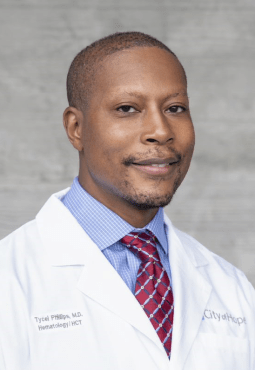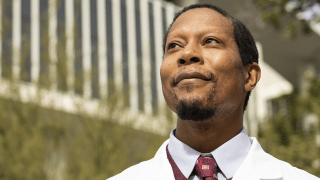Marie Palomino ignored the knot on her neck for nearly a year. Until she couldn’t.
Traveling through Europe in June 2022, the 64-year-old interpreter and public school teacher began to feel weak. She was also losing weight.
Returning to the U.S., Palomino consulted head and neck neck specialist Thomas J. Gernon, M.D., at City of Hope’s South Pasadena facility. Gernon suspected lymphoma.
Limited by her insurance coverage, Palomino went to a hematology facility that frightened her. She began chemotherapy there, but was so put off by the less-than-professional atmosphere that she left in the middle of treatment.
“I was scared,” she said.
Gernon helped Palomino clear insurance hurdles so she could see a City of Hope hematologist.
“I prayed that I’d be sent to the right doctor,” she recalled.
She was sent to lymphoma specialist Tycel Phillips, M.D., just recently arrived from a 10-year stint at the University of Michigan, Ann Arbor. He’d brought a considerable reputation with him, both as a clinician and researcher.
“He pretty much built up Michigan’s lymphoma research program and put it on the map,” said Alexey Danilov, M.D., Ph.D., a longtime friend and colleague and associate director of City of Hope’s Toni Stephenson Lymphoma Center. “He’s a wonderful addition. He’s balanced, level-headed, reliable. He has great ideas. And he’s an old-school physician. He’s in this to help people.”
“He’s humble, unflappable and a natural team leader,” added Ryan Wilcox, M.D., Ph.D., a colleague from the University of Michigan.
Phillips sought a larger infrastructure that would support his research and help it grow. City of Hope’s lymphoma team knew about Phillips for years and worked hard to bring him aboard.
“Whenever you can bring in a world-class, internationally recognized expert, it’s great,” said fellow lymphoma expert Alex Herrera, M.D. “He’s a great friend, a thoughtful person, and he has his finger on the pulse of this field. He’s a senior person who can mentor our junior faculty.”
Seeking Gentler Treatment Options
Raised in the Midwest, Phillips’ desire to help people crystallized during high school when his grandmother, a nurse, died of pancreatic cancer. “That put me on the path to a career in medicine and cancer treatment,” he said. Years later, when his mother struggled with breast cancer, Phillips resolved to find less toxic treatments for his patients. “Chemo,” he says, “provides lots of early ‘bang for the buck,’ but toxicity is always a problem. It’s hard to find a ‘safer’ chemotherapy.”

Phillips has amassed a formidable portfolio. Many of his trials seek to combine chemo with other treatments to reduce toxicity without sacrificing effectiveness. He’s also one of a handful of researchers who specialize in mantle cell lymphoma, an obscure form of the disease that afflicts only about 4,000 people a year. He’s currently running a trial testing a three-drug combination — venetoclax, lenalidomide and rituximab — to treat it. “We took on the sickest of the sick,” he said, “and, so far, the results have been dramatically better than we expected.”
That’s typical, his friends say.
“He’s passionate about a great area of clinical need that’s been understudied,” said Shannon Carty, M.D., another colleague from his Michigan days.
Beyond chemo, Phillips is especially excited by the prospects of targeted immunotherapies, which attack cancer cells without chemo’s typically harsh side effects.
His research paid off for Palomino’s non-Hodgkin lymphoma. Phillips put her on a course of the monoclonal antibody mosunetuzumab while it was still in late trials. (The Food and Drug Administration approved it in December 2022.) Four treatments in, the knot in her neck is gone, scans show no other tumors and Palomino’s platelet count, once dangerously low, has returned to normal levels.
Palomino appreciates her doctor’s leading-edge research chops, but she admires his people skills even more.
‘He Leveled With Me’
“I was so impressed by his demeanor, the way he carried himself,” she recalled. “It felt good talking with him. He’s very down-to-Earth. He was clearly interested in me and spoke to me person-to-person, not doctor-to-patient. He leveled with me, broke down everything in steps — which is the same way I process things myself!
“The things he says to me, make me better. If only other doctors knew how to do that.”
Such praise does not surprise Phillips’ colleagues in the least. Wilcox shared clinic space with him at Michigan. “His workstation was always piled high with gifts from patients,” he said. Carty said bluntly, “If I had a family member with lymphoma, he’s the physician I’d want.”
He’s grateful for the kind words. “I try to arm my patients with information,” he explained. “A cancer diagnosis is one of the hardest things to live with. It puts incredible stress on families. You need to be compassionate. You need to be human.”
He makes a point to approach each patient “the way I would want to be approached.” He’ll look for ways to connect beyond discussing disease and treatment. “I’ve had patients whom I first saw when they were in college, and I stayed with them as they got married and had kids. We’d talk about stuff that had nothing to do with cancer. And I’d get just as excited as they did [by their life events]. Because they’re not just patients, they’re people.”
In large part, his compassion for people led him to lymphoma in the first place. Many forms of the disease are highly curable, and Phillips wanted the opportunity to be able to give patients their lives back.
“It’s the best part of the job,” he said, “when we can talk about a cure in a Stage 4 cancer. But it’s a double-edged sword. When we know we can cure this disease, it makes it much harder when we’re confronted with a case we can’t cure.” He recalled such a case from his early days as a doctor, a woman with aggressive cancer who didn’t survive. “It was like losing a friend.” he said.
Outwardly, Phillips projects a low-key, calm, matter-of-fact style that belies his passion for his work and love for his patients. But he does light up when talking about his kids. He is a proud parent with five children, from age 19 down to age 2, who keep Mom and Dad busy. To relax, the family likes to travel, especially to visit historical sites and, of course, fun locales for the kids.
He thinks of his patients as family, too.
“I’ve been on the other side,” he says, remembering his mother and grandmother. “I know how it feels to be a patient. At any moment it can happen to us.
“I will treat you like family. I will be honest. I won’t mislead you.
“I will partner with you.”
